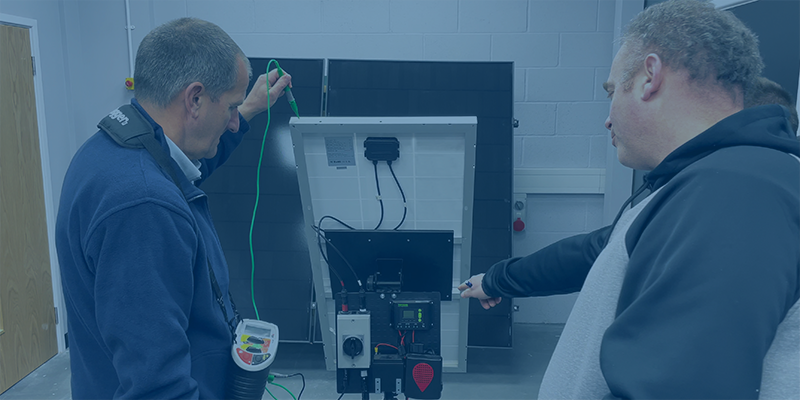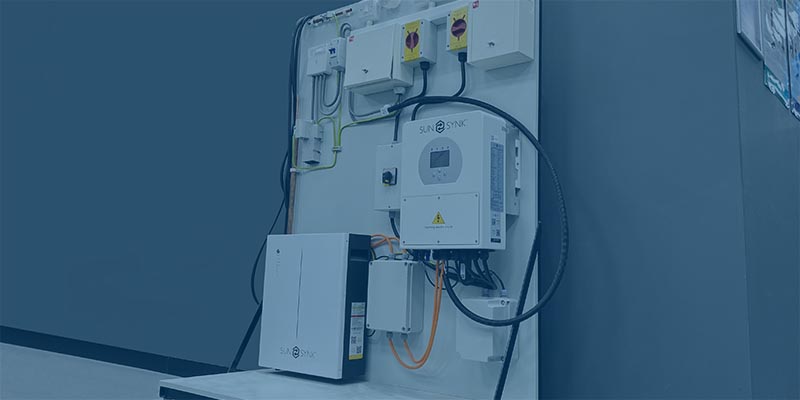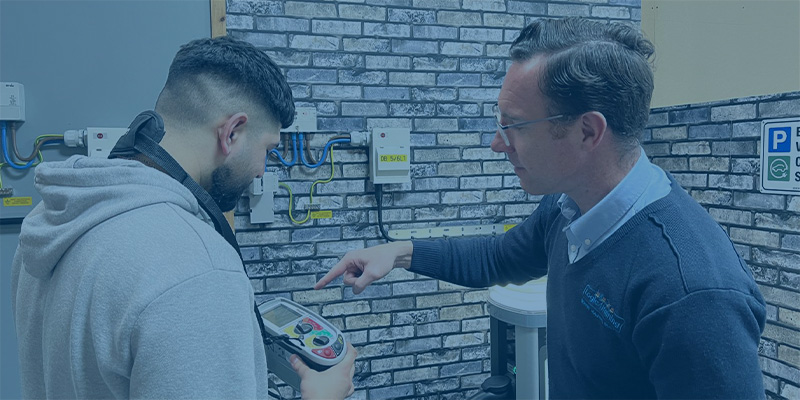
Solar PV Course Level 3 RQF Solar Photovoltaic (PV) Installation Training

Representative example at 12 Months Interest Free Credit at 0% APR
£595
£59.5
£44.63
0%
Purchase price
Deposit
12 Monthly payment
Interest rate

Save 50% on our electrical energy storage systems (EESS) course when you book with solar photovoltaic (PV) training.
This solar pv course is aimed at experienced domestic and commercial electrical operatives who wish to install solar photovoltaics packages.
Take advantage of our package deal: Save 50% EESS course when you book with Solar PV training.
As electricity bills continue to rise, many more people are looking for ways to generate their own power. Solar photovoltaics (PV) is the most popular choice for domestic electricity generation – in the first six months of 2022, there was an 80% increase in home PV installations.
The cost of panels has reduced dramatically over the last 10 years (by as much as 80%), which, when combined with sky-high bills, makes the return on investment much quicker and more attractive. The addition of battery storage will see a system pay for itself in an even faster timeframe.
Overall, solar panels provide certainty of power, less reliance on the grid and shield end-users from fluctuating electricity prices.
The LCL Awards Level 3 Qualification in the Installation & Maintenance of Small Scale Solar Photovoltaic Systems, covers both the practical and theory elements needed to safely and effectively fit this popular renewable technology.
The course is recognised by the Microgeneration Certification Scheme (MCS) – successful candidates can use it towards gaining MCS accreditation. An MCS certified system will give customers peace of mind, is a pre-requisite of any grants that may be available and will help end-users achieve the best export tariffs for power returned to the grid.
The most efficient solar pv systems incorporate a battery to store excess energy and provide renewable power even when the sun isn’t shining. We also deliver the LCL Awards Level 3 Qualification in the Design, Installation & Commissioning of Electrical Energy Storage Systems.
Training takes place in the classroom and on purpose-built rigs, including roof mounting kits and work on ‘live’ equipment. The course culminates in both a practical and written assessment.
The course covers the installation, commissioning and maintenance of small-scale domestic solar PV systems, including the following areas:
- Health & Safety
- All relevant regulations and standards
- The difference between AC and DC circuits
- Solar PV system and component installation
- Design principles to determine pv panel array size and position
- Preparatory work prior to installation
- PV system protection techniques
- Testing, commissioning and handover
- Routine inspection
- Servicing and maintenance
- Fault diagnosis and rectification
The course is designed for experienced electrical operatives who must have the following qualifications:
- 18th Edition Wiring Regulations (BS7671:2018)
- Level 3 Electrotechnical Qualification (S/NVQ) (or equivalent)
- Level 3 qualification in the Initial Verification and Certification of Electrical Installations.
The course provides practical and theoretical knowledge to:
- Design, install, commission, and maintain small-scale domestic solar PV systems.
- Understand AC/DC circuits and system protection techniques.
- Perform routine inspections, servicing, maintenance, and fault diagnosis.
Solar energy is increasingly popular due to:
- Rising electricity bills are prompting homeowners to seek renewable alternatives.
- A dramatic reduction in panel costs (up to 80% over the last decade), with 2024 seeing the average price fall from £9,238 in January to £7,561 in December.
- Government incentives, such as export tariffs for surplus energy returned to the grid. In 2024 alone, there were a total of 184,462 home solar installations.
Battery storage systems:
- Allow homeowners to store excess energy for use during nighttime or peak demand periods.
- Increase energy independence and reduce reliance on the grid.
- Accelerate return on investment by optimising renewable energy usage.
Make the most of your training and save 50% with our Solar Photovoltaic and Battery Storage Package Deal.
In most cases, solar panel installations are considered “permitted development” and do not require planning permission. However, exceptions apply for listed properties, conservation areas, or homes with specific restrictions. It’s advisable to consult your local council or installer.
The MCS is a certification scheme that ensures high-quality renewable energy installations. Obtaining MCS accreditation provides customers with peace of mind about installation standards, is a prerequisite for accessing government grants and can help end-users achieve better export tariffs for surplus power.
Our article How to Become MCS Certified covers everything you need to know about MCS and becoming MCS certified, should you need more information.
The installation process typically takes 1–3 days, depending on system size, roof type, and complexity. Scaffolding setup may add additional time.
The UK government’s ambitious net-zero targets have accelerated renewable energy adoption. With rooftop solar installations booming due to EU directives requiring solar on new builds, skilled installers are essential to meet this growing demand.









